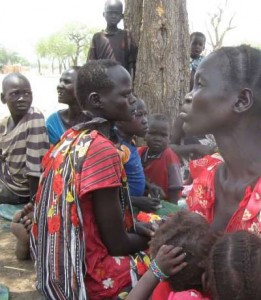Source: afrol News – http://afrol.com/articles/38448
Published Date: March 26th
With the description: “Displaced women and children under a hot sun in South Sudan’s Maban County, where food shortages are causing tension”
This article alarms the readers about how the famine is “imploding” in South Sudan, and the UN’s humanitarian agencies are continuing their effort to ask donors to fund for this nation. Due to the South Sudanese Civil war, which is an ongoing conflict in South Sudan between the forces of the government and the official forces was sparked primarily by the political, and ethnic targeting, South Sudanese civilians have been affected; millions of people have fled the country and more than 10,000 people have been killed. The article grabs the reader’s interest by talking about how there is not much support in parallel to the “[malnutrition and food] escalating at an alarming rate.” The article further remarks about the opposing forces of the government, at which makes the humanitarian movement to be challenged. Nevertheless, the article enlists the hardships that people face in regards to the famine and malnutrition in South Sudan due to the ongoing civil war, proposes some of the difficulties that the UN humanitarian agencies face, and talks about the need for funding.
It is important to be aware of this issue because as the title of the article warns, “Famine warning: South Sudan is imploding.” With its catchy words such as “warning” and “imploding,” it nevertheless grabs the attention of the readers. Nevertheless, it is true that millions of civilians are being affected due to the civil war. However, what is most important about this article is that it raises the notion that a civil war still exists; there are still nations struggling for democracy. For instance, President Salva Kiir accused the UN of taking his position sheltering the civilians; hence, the UN base was armed with government troop and policeman on February 10th. If people are more aware of this issue, then more organizations, funding, the trade between South Sudanese rich goods can be facilitated, and could help prevent South Sudan from “imploding.”
Although this article is well organized and is informative, the usages of words to describe the situation of South Sudan, in general, are derogatory. For instance, the article uses words such as “devastating” “imploding “urgent” “crisis” to describe the famine in Sudan. These words connote not only the urgency of the situation, but also emphasize the severity of the situation, which instills fear and distress on the readers. The article further appeals to logos, as the author uses numerical values to gain credibility of his article. For instance, the author uses the numerical values “5 million people (numbers) people in need of humanitarian assistance.” “500,000 children affected” to outline the severity of this situation. The author seems to be using these numerical values to gain sympathy from the readers. Furthermore, the author repetitively uses the word “almost,” which connotes the idea of uncertainty; “Almost (uncertainty) 400,000 (numerical value)” “…almost (uncertainty)200,000 (numerical value).” This word usage shows that he’s making an estimate on how much the people are being affected, perhaps, again trying to magnify and augment the severity of the situation.
The impressions of these words are negative, and stereotypical to say the least. It continuously puts down the nation as a whole, and insists on getting help from other nations, augmenting the stereotypes. It may be possible that the author intentionally used words that evoke negative emotions so that the readers would be persuaded to help the cause; however, such word choices only leaves the readers to have negative impressions of the nation.
The source of the story was from Afrol, which is independent news that exclusively covers the African continent. Because it is a fairly reliable source, it nevertheless can have an influence on the reader’s mind with its structure, tone and the word usage of the article. Showing the dilapidated town as the main picture, followed by a close-up shot of the citizens with hopeless and saddened face expression seems to not only intensify the situation but also provoke negative emotions of sympathy and distress among readers. If this article were published from an unofficial newspaper agency, then the credibility of the article would have been lower; hence, it would have had less influence on the readers from shaping perceptions of this issue. However, since it is an independent agency that focuses on the African continent, it definitely affects people’s insight.
I believe that the content was well laid out; however, the structure, word usage and tone seemed to have been too exhaustive. As I’ve mentioned earlier, the words in general are very negative, making the overall tone to be defeated, pessimistic, and dismissive. In my opinion, the content of the article is important; however, the overall tone of the article was that the South Sudan need to rely on other nations to recuperate the situation. It would have been better if the article presented some positive aspects of the nation, such as its rich natural resources: petroleum, iron ore, copper, chromium ore, silver, gold and etc. which are definitely resources that can help accommodate for the “famine” there. All in all, the article should have used more hopeful words to show that South Sudan, too, is capable of resolving the issue.


